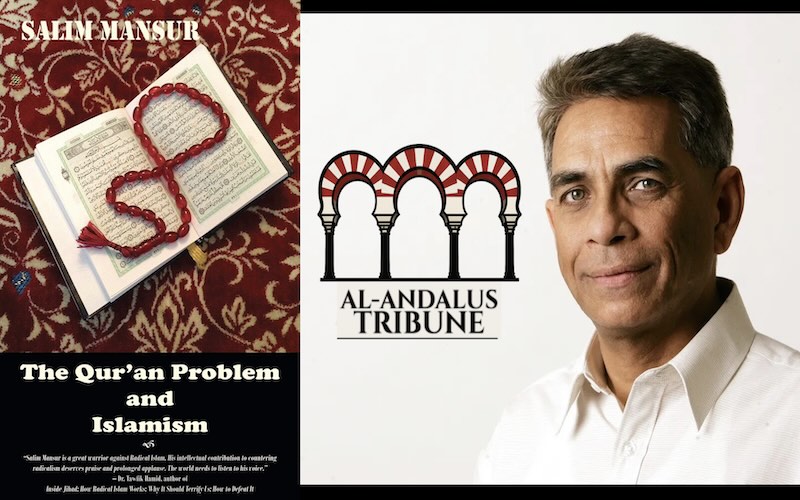Political science professor emeritus Salim Mansour discusses his 2017 book The Qur’an Problem and Islamism. In it, he argues that power-hungry people have long been politicizing the Qur’an by championing their own (often simplistic) interpretations and demonizing other interpretations, from the time of the First Fitna to our own era, and that the results have generally been disastrous.
But does that mean that all forms of “political Islam” or “Islamism” are inherently untenable? Does the fault lie with religion and its interpretations, or with the inherently conflictual nature of politics? And are many or even most of the apparent excesses of modern Islamism, above all the phenomenon of “Islamic terrorism,” illusions created by the enemies of Islam by way of false flags and other forms of propaganda?
In this podcast, Prof. Mansour discusses and debates these and other issues with Islamic Studies colleague Kevin Barrett.
Excerpt:
Welcome to Truth Jihad audiovisual and the Al-Andalus Tribune podcast. I’m Kevin Barrett bringing on the most interesting folks I can find from all over the world with something important to say about religion, politics, 9/11 truth and other heresies—basically anything you’re not supposed to talk about at the family dinner table.
Today it’s Salim Mansur, the author of The Quran Problem and Islamism, a very provocative and stimulating book that I received in my P.O. box here in Saidia, Morocco, not too long ago. So thank you for having sent that, Salim Mansour, and welcome.
Thank you so much, brother. It’s a pleasure to be with you.
Yes, it’s wonderful to be back with you too.
Your book made me think about Stanley Fish. Stanley Fish is a famous Jewish literary theorist. I’m not sure why he’s so famous. I don’t think he’s really that interesting. But in any case, he wrote a full-page New York Times op-ed about me in 2006. And in that op-ed he was essentially trying to come on board with the side of the media that was calling for me to be fired from my teaching job at the University of Wisconsin-Madison. And he took a very strange and circuitous route to his argument. Unlike Sean Hannity and Bill O’Reilly, who simply said that I was corrupting the youth of Athens with horrible conspiracy theories and had to be silenced, Stanley Fish—his book title was There’s No Such Thing as Free Speech and It’s a Good Thing Too—came up with this weird deconstruction-style argument based on a false premise, which was that I was teaching 9/11 truth conspiracy theories in my classroom.
And that wasn’t true. I never did anything like that. But they attacked me with that talking point because what I was actually doing was that in an 18 week Intro to Islam course, I was spending one week talking about interpretations of the War on Terror including the neocon interpretation, the John Esposito liberal interpretation, and then the Muslim majority interpretation, which is that it was a false flag. The polls showed that about three quarters of the world’s Muslims and two thirds of American Muslims knew it was a false flag from the get-go and never stopped saying that. So I was at least going to mention that. But I was not going to tell the students, I would never have told them, what I thought about it.
Anyway, so Stanley Fish comes up with this false premise that I’m going to be teaching my particular interpretation of 9/11 in the classroom. And then he says, “academic freedom should not cover this.” Why not? He says (elsewhere) that professors should not try to teach anything recent in history (i.e. advocate for a particular interpretation) because they might be wrong. He says it’s fine for professors to teach their own interpretations of World War I, maybe World War II, certainly ancient Athens and things like that, and ancient old European history from centuries ago. That’s all fine. But professors shouldn’t be teaching their own views about any recent history. That was one of his arguments about why it was okay that I should be thrown out of the university.
When I read your book here, I was reminded of that. The title is The Quran Problem and Islamism. And your treatment of the Quran problem, which of course is a 1,400-year-old issue, I find generally brilliant and fully defensible. And even if you want to pick a bone with it here or there, there’s not a major problem with it. It’s a very, very good contribution.
However, your discussion of Islamism, the phenomenon of political Islam in recent decades, which has been so heavily conditioned by 9/11 and other Israeli false flag attacks attributed to radical Muslims—I think you got a lot of things wrong in your treatment of Islamism. And so that actually suggests that maybe Stanley Fish wasn’t as crazy as I thought he was, and that when one writes about recent events, one runs the risk of having to revise one’s thinking in light of new information.
So that was my first take on your book. What do you think?
There’s a lot to unpack in what you have said. It’s interesting that Stanley Fish would make a critique of you in the fashion that he did, given the fact, as far as I know, he was a professor of Comparative Literature and English and so on and so forth. And that’s the debate that goes on in literature. Shakespeare scholars are still arguing about who was Shakespeare.
So Stanley Fish’s complaint was contra his own work, you know, on that basis… Anyhow, so yeah, I mean, the question of Islamism is, in a sense, open to debate and dispute. I would suggest…you’re putting it in the context of 9/11 and thereafter. We live in a stream of time. Events happen, and then they become history. Episodes happen, then they become pasts. The pastness of the past remains with us. We cannot get away from it. It is embedded in our consciousness, in our mind, in our intellect as we try to understand where we are today, and where we are progressing.
So…Islamism is not something that emerges with 9/11. I would say it emerges with the Prophet and immediately after the Prophet the the first and greatest crisis in Muslim history, the fitna after the Prophet’s death, which leads to the elimination of the Prophet’s family. And it was the elimination of the Prophet’s family not by Hindus or Jews or Christians or Zoroastrians. It was the elimination of the Prophet’s family by the very people to whom the prophet brought the message: the Arabs, the bedouins, who saw the Prophet, who lived with the prophet, who saw how he dealt with his family. And it is they who did what in our language today would be called crimes against humanity.
And so in my book, I was trying to put all of that together within the limited space, and I was trying to reach to the ordinary Muslim. I don’t know whether they will read it. But from my perspective also, the book was written in the post-9/11 context because I saw, and I’m sure you have seen, that 9/11 was not only a false flag operation, but it opened the gate to the most vicious attacks on the Prophet without any defense of the Prophet. Even a cold-blooded murderer has a defense in the court. But here in in the court of world opinion, the Western world and its intellectuals driven by Zionists and polemicists and people like Robert Spencer and others, just unloaded upon the Prophet with all sorts of ad hominems that we don’t have to go into.
Anybody honest enough would have to say: If you’re going to talk about the Prophet and Islam, have we forgotten Jesus’ admonishment that take the beam out of your eyes before you take the mote out of the eyes of your neighbor? I mean, that is the primary epistemological foundation of any honest human being, particularly scholars and academics and writers and thinkers, that we take the beam out of our eyes.
(Read the full transcript at the Al-Andalus Tribute Substack by clicking on “transcript” above the video image.)






